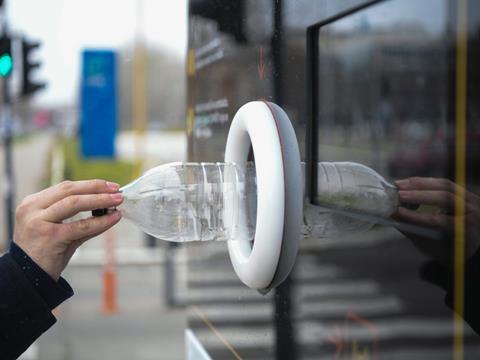
Romania is rolling out a centralized deposit return system (DRS) – said to be one of the world’s largest with almost 80,000 collection points – and seeks to increase collection and recycling rates for single-use beverage containers.
Drinks packaging made of plastic, glass, and metal in sizes between 0.1 and 3 litres are compatible with the scheme, which charges a deposit of 0.5 Romanian lei (the rough equivalent of €0.10) per container. It is mandatory for all legal entities that produce, import, or sell beverages in single-use containers to take part in the scheme.
As well as improving the purity of collected materials, increasing their circularity, and driving down CO2 emissions, the integrated system hopes to establish Romania as a world leader in DRS.
The scheme makes use of Sensoneo’s ready-to-integrate IT system, which is designed to be agnostic with any return vending machine and adaptable to suit individual countries’ requirements. It is set to bring stakeholders together and collect data from across the process chain.
In the preliminary phase, a market-mapping tool was provided by Sensoneo to register all entities and their beverages into the system, at which point digital data collection and analysis and automated digital contracting took place. Now the full DRS system features modules for all aspects of preparation, operation, and reporting.
Its main modules include a web portal for producers and retailers; registers for packaging and collection points; systems for enterprise resource planning (ERP), reporting, and document managing; interfaces with other systems, like RVM and counting and sorting centres; and mobile applications. These are designed to fulfil stakeholder obligations and meet specific requirements.
Each module is hosted on Microsoft Azure Cloud infrastructure, which is expected to offer security protection and ‘unlimited’ opportunities to scale performance.
RetuRO has been named as the system operator. The consortium consists of private entities in the retail and beverage production industries, as well as the Romanian Ministry of Environment, Waters and Forests.
Following the complex setup of equipment, integration of software, and identification and securing of regional centre locations, RetuRO anticipates the management of around seven billion beverage containers every year.
“Despite many challenges, we managed to implement a very complex system in an unbelievably short time,” explained Cristian Mihai, IT director at RetuRO. “We are talking about an extremely complex, modular system, which will have to not only support the information received from almost 80,000 economic operators but also correlate identification, stock, return, collection, invoicing, and reporting data for almost 7 billion packages. The novelty and the revolutionary nature of this system make it equally exciting and provocative.”
“We are very proud to take an important part in building the world’s largest integrated Deposit Return System,” adds Martin Basila, CEO and co-founder of Sensoneo. “We are thrilled to contribute to this groundbreaking initiative with our cutting-edge software tailored to customer’s unique demands.
“Sensoneo is committed to providing innovative solutions that align seamlessly with the intricate requirements of this monumental project, and we look forward to playing a pivotal role in the success of the Romanian Deposit Return System.”
Peter Knaz, the head of Sensoneo’s DRS and Take-Back division, concludes: “We are happy another European country is on the path to implementing Deposit Return Scheme. I believe it is the right step for Romania to increase the recollection of clean material streams and decrease waste pollution.
“Our DRS IT solution is a perfect fit for large-scale deployment as it provides one stop shop platform for all stakeholders of the DRS system with a high level of waste management automation and financial streams.”
The news comes after Sensoneo helped launch a nationwide deposit return scheme in Malta last year, a move expected to drive up recycling rates and influence consumer awareness around sustainability in packaging.
Additionally, TOMRA has entered into a long-term agreement to invest €36 million and provide ‘reverse vending machines’ for a deposit return scheme commencing in Quebec next year.
Reloop and the Container Recycling Institute have also argued against claims that deposit return systems for beverage containers negatively impact sales, instead suggesting that DRS are the most effective method of producing clean and high-quality recycled materials that comply with brands’ plastic reduction targets and upcoming legal mandates.
Meanwhile, Sensoneo has unveiled a smart waste monitoring solution that collects data from light packaging, textile, glass, organic, and general waste discarded in public bins in Madrid – aiming to streamline waste collection and save both time and money.
If you liked this article, you might also enjoy:
The L’Oréal approach to packaging sustainability
The way we talk about plastic needs to change – here’s how to get it right
What steps is Apple taking to make its packaging more sustainable?














No comments yet